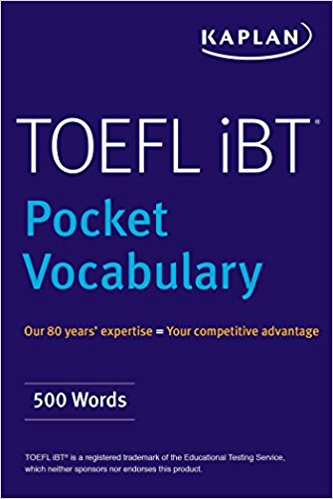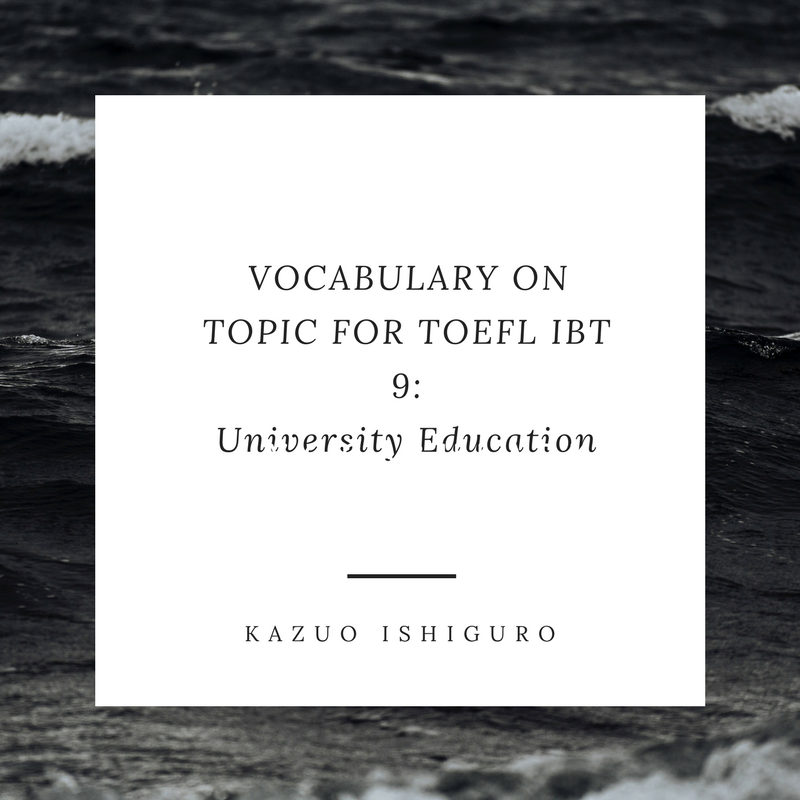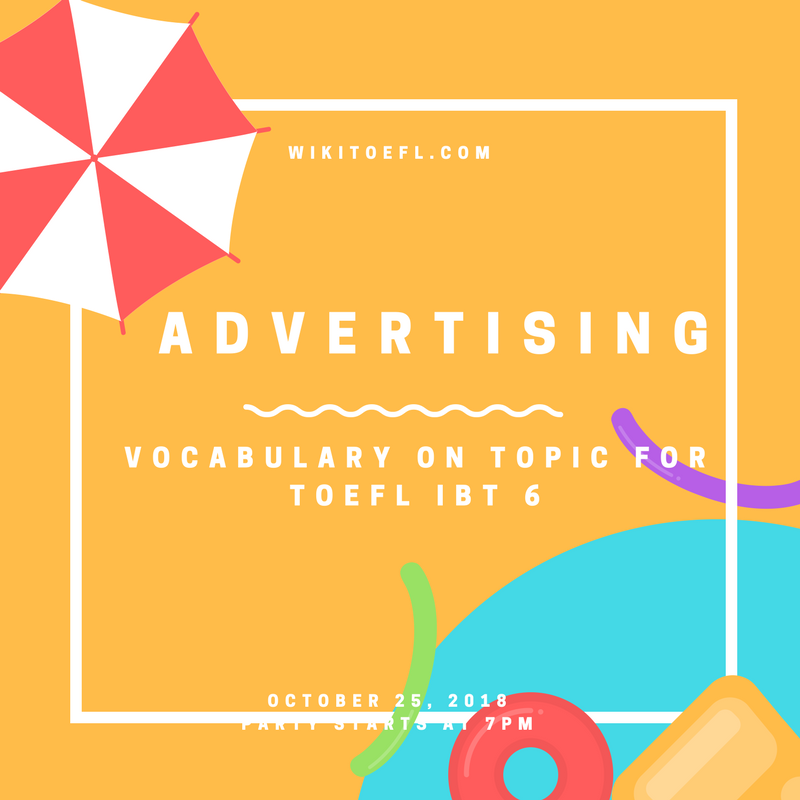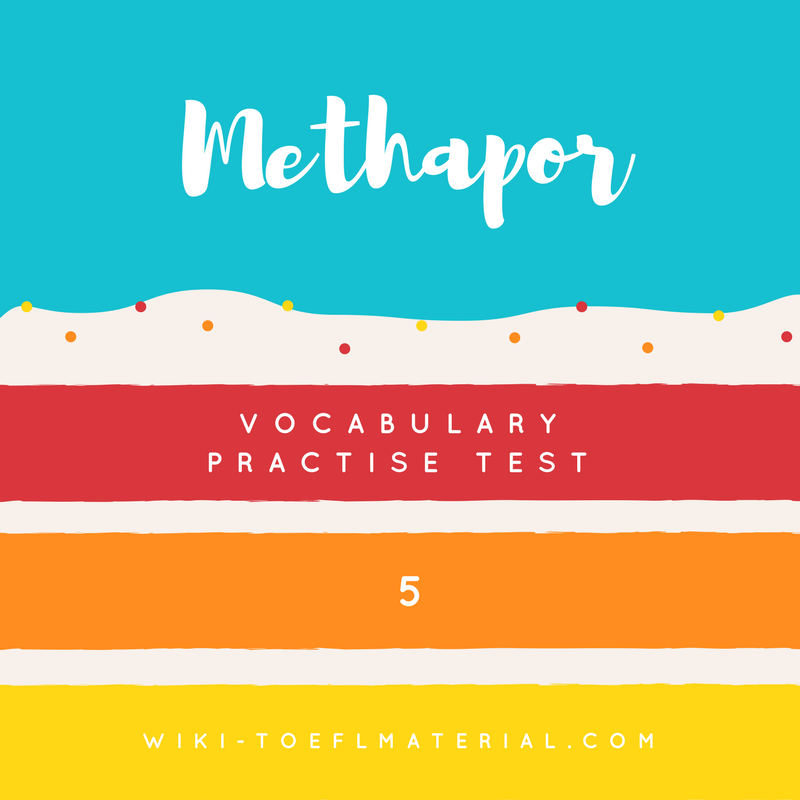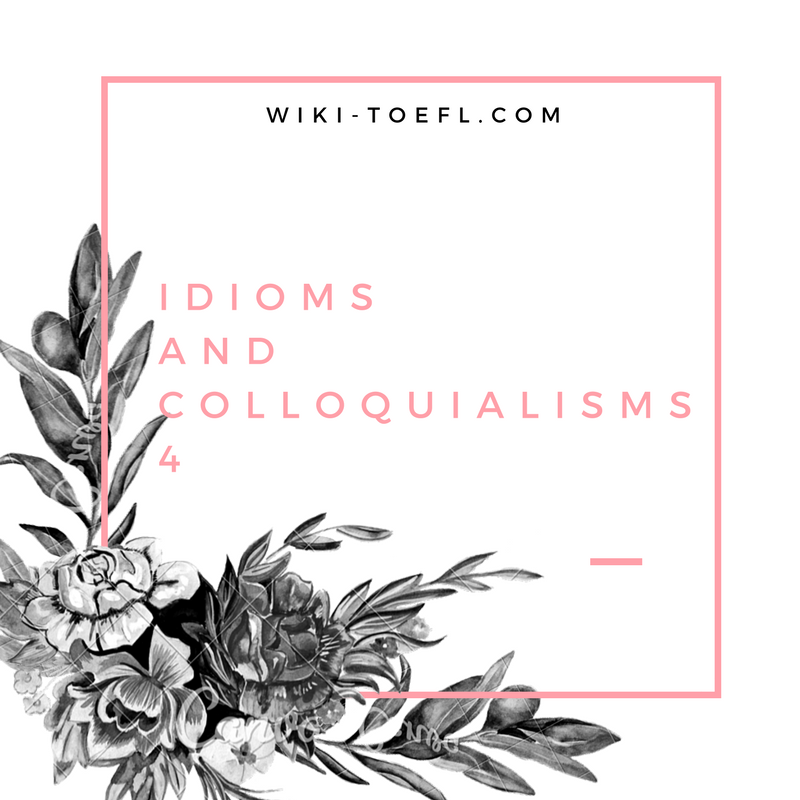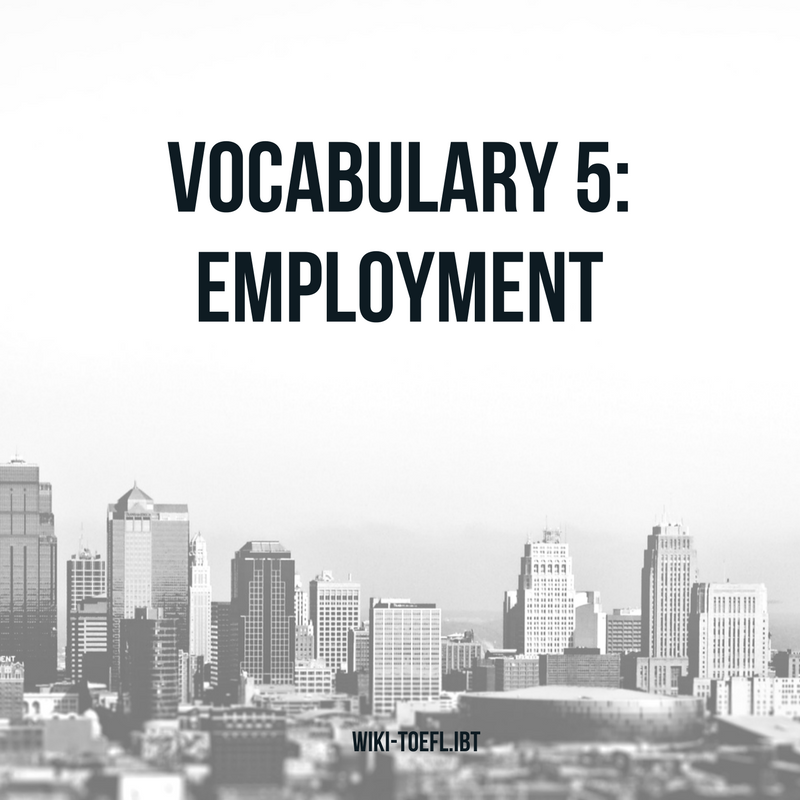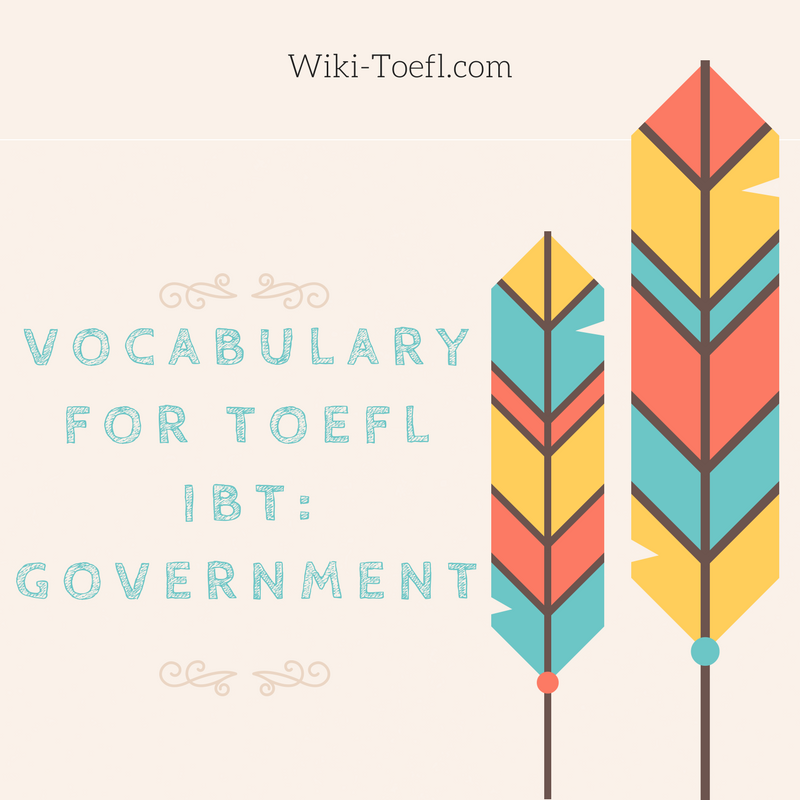Developing solid TOEFL vocabulary skills can be one of the most challenging parts of studying for the exam, but it’s also one of the most important. Many TOEFL questions either ask you the definition of a word outright or require you to have knowledge of certain words in order to answer a question correctly. With so many words in the English language, which are the ones you need to know?
We’ve done the hard work for you and determined the 327 most useful TOEFL words to know. They’re all listed below, along with a definition and sample sentence for each. We also end with tips on how to use this list most effectively in order to be prepared for vocabulary on the TOEFL.
How Did We Compile This TOEFL Vocabulary List?
To create this list, we first read through official TOEFL practice materials and made a list of all the words a person taking the TOEFL might struggle with. This was our primary source and finds words that you’re more likely to see on the real test. Next, we cross-referenced our list with TOEFL vocabulary lists from other sites, such as Magoosh and TOEFL Vocabulary, and examined their overlap with our list.
Words that appeared especially frequently from our research was automatically added to the final TOEFL vocabulary list you see below, as well as a selection of other words deemed particularly useful to know for the TOEFL. Once the list of 327 best words was compiled, we added a definition and sample sentence to each one to help you better understand the words and how they are used.
The 327 TOEFL Words You Need to Know
Below are the 327 best TOEFL vocabulary words, in alphabetical order.
| Word | Definition | Sample Sentence |
| Abundant | Present in large quantities. | Living close to a lake means we have an abundant supply of water. |
| Accumulate | To gradually collect. | Each fall, leaves accumulate in our driveway. |
| Accurate | Correct; free from errors. | Make sure your address is accurate before submitting your online order. |
| Accustomed | Used to something. | Having 8AM classes means I’m accustomed to getting up early. |
| Acquire | To come into possession of. | When my grandmother died, I acquired her cookbook collection. |
| Adamant | Refusing to change an opinion. | The defendant was adamant that he was innocent. |
| Adequate | Enough to suit your needs. | Our house isn’t big, but it’s adequate for the two of us. |
| Adjacent | Close to or next to. | The park is adjacent to the school. |
| Adjust | To change something so it serves its purpose better. | The bike seat may be too high; you’ll probably need to adjust it. |
| Advantage | Something that makes it easier to achieve success. | His height gives him an advantage in basketball. |
| Advocate | To publicly support. | My aunt is a major advocate for women’s’ rights. |
| Adverse | Unfavorable; against one’s desires. | I had an adverse reaction to my medication and had to stop taking it. |
| Aggregate | To combine. | We should aggregate our resources to share them more easily. |
| Aggressive | Assertive and pushy. | The salesperson was very aggressive when trying to get us to buy the television. |
| Allocate | To put aside for a specific purpose. | The village needs to allocate funds for building the new school. |
| Alternative | Another option or choice. | If the ATM is broken, an alternative solution is to stop by the bank. |
| Amateur | Someone who is inexperienced or not highly skilled in a particular area. | He’s an amateur soccer player and is still learning the rules of the game. |
| Ambiguous | Having several potential meanings; unclear and difficult to understand. | When I asked the HR manager what my chances were of getting the job, she gave me a very ambiguous reply. |
| Ambitious | Having large goals. | My son is very ambitious and hopes to be a millionaire by the time he’s thirty. |
| Amend | To change for the better; to improve. | I believe we should amend our country’s tax laws. |
| Ample | Plentiful. | Our new apartment has ample space for the two of us. |
| Anomaly | Deviation from the norm. | The basketball player is the team’s best free thrower, so his missing both shots was an anomaly. |
| Annual | Occurring yearly. | The annual company barbeque takes place every August. |
| Antagonize | To tease or be hostile towards a person or group. | The boy loves to antagonize his little sister by pulling her hair. |
| Attitude | Manner or feeling. | After she got grounded, the teenager had a bad attitude for the rest of the day. |
| Attribute | To give credit. | Be sure to attribute credit to your sources when writing a research paper. |
| Arbitrary | Based on a whim or random decision. | Flipping a coin is an arbitrary way to make a decision. |
| Arduous | Requiring a lot of effort. | After you cross the bridge, there’s an arduous walk up the hill. |
| Assuage | To lessen a negative feeling. | The mother assuaged her child’s fear of the dark. |
| Assume | To suppose without solid proof. | I assumed he was rich because he worked as a lawyer. |
| Augment | To increase or make larger. | She augments her regular salary by babysitting on the weekends. |
| Benefit | Something positive or advantageous. | A benefit of doing homework on Friday is that your weekend will be free. |
| Berate | To scold. | Our neighbor berated us after we broke his window playing baseball. |
| Bestow | To give as a gift. | The medal was bestowed upon him by the president. |
| Boast | To brag or talk with excessive pride. | He always boasts of his talents after he wins a game. |
| Boost | To help raise or increase something. | I gave him a pep talk to boost his self-esteem before his speech. |
| Brash | Rude and tactless. | The brash man always asked inappropriate questions. |
| Brief | Short (in terms of time). | It will only have a brief meeting, so you’ll still have plenty of time for lunch. |
| Brusque | Abrupt to the point of rudeness. | After being away for so long, I expected more than her brusque greeting. |
| Cacophony | A harsh, unpleasant mixture of noise. | The cuckoo clock shop lets off a cacophony every hour. |
| Cease | To stop. | I wish they would cease arguing. |
| Censure | To express strong disapproval. | Every parent in our district censured the education cuts. |
| Chronological | Arranged in order of time or date. | Put the historical events in chronological order to make them easier to study. |
| Clarify | To make clear; to remove confusion. | I didn’t understand the instructions, so I asked the teacher to clarify them. |
| Coalesce | To combine or grow together. | The people on the street eventually coalesced into a group. |
| Coerce | To force someone to do something against their will. | The young boy was coerced into stealing by his friends. |
| Cognizant | Being aware or having knowledge of something. | Before mountain climbing, you need to be cognizant of the risks. |
| Cohesion | Uniting; becoming one. | Water molecules show strong cohesion when they stick together. |
| Coincide | To occur at the same time. | This year Thanksgiving coincided with my birthday. |
| Collapse | To fall down or break down. | The old building finally collapsed, leaving nothing but a pile of rubble. |
| Collide | To hit one another with a forceful impact. | The two cars collided on the freeway. |
| Commitment | Dedication to a cause or activity. | Joining a school play is a big commitment. You’ll need to practice every evening. |
| Community | A group of people who live or work together. | The Chinese community in my city is hosting a New Year celebration next week. |
| Conceal | To hide. | The mountains concealed the ocean from view. |
| Concur | To agree. | He believes women should be paid as much as men, and I concur. |
| Conflict | A disagreement or fight. | The conflict between the two families has been going on for generations. |
| Constrain | To restrict or repress. | You should move your plant to a bigger pot, otherwise you’ll constrain its roots. |
| Contemplate | To consider thoughtfully. | I spend a lot of time contemplating what career I want to have. |
| Continuously | To go on without stopping. | My neighbors have been continuously blasting their music since last night. |
| Contradict | To give the opposite opinion. | I told the employees that sales were down, but my boss contradicted me and said sales were actually up. |
| Contribute | To give something (usually money or time) to a common fund or cause. | Every roommate contributes part of his paycheck to the grocery bill. |
| Convey | To make known. | I’ve conveyed my interest in working for that company. |
| Copious | Abundant. | He always takes copious notes during class to study later on. |
| Core | Central; of main importance. | Although many employees left the company, the core leadership remained. |
| Corrode | To gradually wear away. | The rust corroded the paint on my car. |
| Cumbersome | Burdensome; clumsy | Trying to carry four grocery bags at once was very cumbersome. |
| Curriculum | The courses given by a school or program. | Our school needs to add more music courses to its curriculum. |
| Data | Facts, statistics, or pieces of information. | The data from these graphs show that yearly temperatures are increasing. |
| Decay | To decline in health or excellence. | After the tree died, its wood began to decay. |
| Deceive | To trick or mislead. | He deceived me by pretending to be a millionaire. |
| Decipher | To find the meaning of. | The spy deciphered the secret code. |
| Declaration | An announcement. | He made a declaration to the office that he was quitting. |
| Decline | 1. To politely refuse.
|
1. I declined his offer of a ride home.2. Her health has declined ever since she turned 70. |
| Degrade | To lower in quality. | My attempt at cake degraded into a crumbly mess. |
| Demonstrate | To show. | Let me demonstrate the proper way of throwing a football. |
| Deny | To state that something isn’t true. | He denied being the robber. |
| Deplete | To significantly decrease. | Your shopping sprees have depleted my savings. |
| Deposit | To deliver and leave an item. | Please deposit your books in the bin outside the library. |
| Desirable | Worth having or wanting. | Bravery is a desirable trait for firefighters to have. |
| Despise | To hate. | I despise early morning classes. |
| Detect | To locate something. | The police dog detected the missing child’s scent. |
| Deter | To discourage. | The warning signs on the house deterred trespassers. |
| Deviate | To differ from the norm. | I decided to deviate from my normal route home and took a shortcut. |
| Devise | To plan or create. | The coach devised a plan for winning the game. |
| Diatribe | A sharp criticism or attack. | The politician went into a diatribe against her opponent. |
| Digress | To wander from the main subject. | The teacher digressed from the lecture to discuss the weather. |
| Dilemma | A situation where one must choose between two difficult choices. | The student faced the dilemma of attending school sick or missing her exam. |
| Diminish | To shrink or reduce. | Sprinkle baking soda on the carpet to diminish the stain. |
| Dispose | To get rid of. | I need to dispose of this trash. |
| Disproportionate | Too large or small when compared to something else. | The piece of pie I received was disproportionately small. |
| Disrupt | To interrupt by causing a disturbance. | The protesters disrupted the politician’s speech. |
| Distort | To misrepresent. | The camera filter distorted the image. |
| Distribute | To give portions of something. | Distribute the materials evenly among the class. |
| Diverse | Showing a lot of variety. | This city has a very diverse population. |
| Divert | To cause a change of course. | Because of the accident, the police had to divert traffic down a side street. |
| Dynamic | Constantly changing. | The theater has dynamic shows, so you never know what you’ll see. |
| Ease | To reduce unpleasantness or difficulty. | This prescription will ease your allergies. |
| Efficient | Maximizing productivity. | Now that I’m following a schedule at work, I’m much more efficient. |
| Eliminate | To remove. | Our team lost the match and was eliminated from the competition. |
| Elite | A select, above-average group. | The elite detective team were also sent for when there were big crimes. |
| Eloquent | Moving speech or writing. | Her eloquent writing has gained her many fans. |
| Emphasize | To give special importance to when speaking or writing. | The teacher emphasized the due date of the project. |
| Endure | To suffer through something difficult with patience. | He has endured four knee operations so far. |
| Enhance | To intensify or magnify. | The falling snow enhanced the beauty of the small village. |
| Epitome | A perfect example of something. | The duchess is the epitome of class. |
| Equivalent | Equal. | Twenty-four is equivalent to two dozen. |
| Erroneous | Incorrect. | He apologized for his erroneous statement. |
| Estimate | An approximate value. | Try to get an estimate of the number of people attending the concert. |
| Evade | To avoid or escape. | By hiding in the bathroom, we were able to evade the intruder. |
| Evaluate | To assess. | At the end of the class, every student will evaluate how well the professor taught. |
| Evidence | Facts or information that help prove or disprove something. | These fossils are evidence of evolution. |
| Evolve | To gradually change. | The small school evolved into a world-class institution. |
| Exemplary | Worthy of imitation. | She is an exemplary student, and you should copy her study habits. |
| Exclude | To leave out. | The young boy was excluded from his friends’ soccer game. |
| Exclusive | Not admitting the majority. | We may not be able to get in since that club is very exclusive. |
| Expand | To increase in size. | Adding air to bike tires will cause them to expand. |
| Expertise | Expert knowledge or skill in a particular field. | The surgeon’s expertise is knee surgeries. |
| Exploit | To use selfishly. | The company exploited its workers by making them work long hours. |
| Expose | To reveal or unmask. | The emails presented exposed the company’s corruption. |
| Extension | An act of making something longer. | If you’re sick on the day the paper is due, the teacher may give you an extension on the due date. |
| Extract | To get or remove something. | The dentist extracted one of my teeth. |
| Famine | A time when there is an extreme lack of food. | Millions of children in Ethiopia died due to the famine there. |
| Feasible | Possible to do. | This study plan you made for me sounds feasible, even with my work schedule. |
| Finite | Having an end or limits. | Remember that life is finite; you’re not immortal. |
| Flaw | A feature that ruins the perfection of something. | I got the diamond for a reduced price since the stone had a flaw. |
| Fluctuate | To change continually. | I’m not sure what to wear since the temperature has been fluctuating so much. |
| Focus | The central point or idea. | The program is going to focus on environmental issues. |
| Fortify | To strengthen. | The king decided to fortify the castle walls to protect them during attacks. |
| Framework | A skeletal structure designed to support something. | Skyscrapers must have a strong framework to support all the floors. |
| Frivolous | Unnecessary; of little importance | You must stop spending your money on frivolous purchases. |
| Function | A purpose natural to a person or thing. | The function of petals is to attract insects to the plant. |
| Fundamental | Of primary importance. | Learning scales is fundamental to being a good piano player. |
| Gap | A space in between to objects. | Be careful to avoid the gap between the two steps. |
| Garbled | Communication that is distorted and unclear. | Our answering machine is so bad that people’s voices are always garbled. |
| Generate | To produce. | The fire generates heat, which keeps the room warm. |
| Grandiose | Pompous; overly important. | The actress had only one small part before she got grandiose ideas of her fame. |
| Hackneyed | Overused and unoriginal. | HIs poems contain many hackneyed phrases. |
| Haphazard | Lacking planning. | There was no schedule, so the event was very haphazard. |
| Harsh | Not gentle; unpleasant. | Her comments on my performance were very harsh and not kind at all. |
| Hasty | In a hurry. | In order to avoid the police, the robbers made a hasty retreat. |
| Hazardous | Full of risk. | The nuclear reactor has a lot of hazardous waste. |
| Hesitate | To pause, often due to reluctance. | She hesitated before entering the abandoned building. |
| Hierarchy | A ranking system. | In the office hierarchy, the manager is higher than the associate. |
| Hindrance | Something that causes delay or resistance. | Her hatred of public transportation is a hindrance when trying to get around New York City. |
| Hollow | Empty inside. | The dead tree is hollow. |
| Horror | An intense feeling of fear. | The haunted house filled me with horror. |
| Hostile | Extremely unfriendly. | My ex-boyfriend’s new girlfriend was very hostile towards me. |
| Hypothesis | An unproven idea that attempts to explain something. | You’ll need to conduct an experiment to test your hypothesis. |
| Identical | Exactly the same. | The twins were completely identical. |
| Illiterate | Unable to read. | Because he’d never been able to attend school, the man was illiterate. |
| Illustrate | To explain by using an example. | The professor illustrated the lesson with a personal story. |
| Impact | Effect or influence. | His moving words had a large impact on me. |
| Impair | To worsen. | Drinking alcohol will impair your driving abilities. |
| Implement | To carry out. | We will implement the new schedule starting next semester. |
| Imply | To strongly suggest. | My mother implied that I was the one who forgot to take out the trash. |
| Impose | To force upon. | After the riots, the mayor imposed a curfew on the town. |
| Impoverish | To reduce to poverty. | These medical bills are going to impoverish me. |
| Incentive | A reason to do something. | I hate my job, but the big paychecks are a good incentive to stick with it. |
| Incessant | Continuing without pause. | I can’t sleep because of the dog’s incessant barking. |
| Incidental | A minor part. | Don’t worry about your grade on this quiz; it’s only an incidental part of your grade. |
| Incite | To urge on. | The ringleader incited the soldiers to rebellion. |
| Inclination | A preference. | My inclination is to go to bed early. |
| Incompetent | Incapable; lacking ability. | The incompetent worker was fired from his job. |
| Inconsistent | Changing randomly. | His pitching has been very inconsistent all season. |
| Indefatigable | Untiring. | She is an indefatigable hiker and can walk all day. |
| Indisputable | Not able to be challenged. | She’s the indisputable star of the basketball team. |
| Ineffective | Not producing any major impact. | The drug was shown to be ineffective at curing cancer. |
| Inevitable | Unable to be avoided. | Even if you’re healthy, death is inevitable in the end. |
| Infer | To guess based on evidence. | I inferred that she was annoyed based on her body language. |
| Inflate | To increase in size. | Getting a promotion has really inflated his ego. |
| Influence | The ability to have an impact of something. | The older sister has been a positive influence on her younger siblings. |
| Inhibit | To hinder or restrain. | This cleaning spray inhibits the growth of bacteria. |
| Initial | The first. | She was the initial president of the company. |
| Inquiry | An investigation to determine the truth. | Congress launched an inquiry after the senator was accused of taking bribes. |
| Integral | Necessary to complete the whole. | You can’t quit. You’re an integral part of this team. |
| Integrate | To combine. | When making a cake, you need to fully integrate the wet and dry ingredients. |
| Interpret | To explain the meaning of something. | I need you to interpret this German speech for me. |
| Intervene | To come between people, objects, or an event and change what is happening. | When the toddlers couldn’t share their toys, their mothers had to intervene. |
| Intrepid | Fearless. | The intrepid mountain climber reached the top of Mt. Everest. |
| Intricate | Highly detailed. | The pattern on this blanket is so intricate. |
| Invasive | Intrusive. | We found the stranger’s questions too personal and very invasive. |
| Investigate | To examine or study. | The police are going to investigate the crime scene. |
| Irascible | Easy to anger. | Even though my grandfather seems irascible, he’s actually very loving. |
| Irony | The use of words to give a meaning opposite to their literal meaning. | “I love spending my Friday nights doing homework,” she said with irony. |
| Irresolute | Uncertain. | Not sure which direction to go in, he stood irresolute. |
| Jargon | Words specific to a certain job or group. | To be a successful doctor, you’ll need to learn a lot of medical jargon. |
| Jointly | Together. | The newlyweds jointly opened up a bank account. |
| Knack | A special talent or skill. | My brother has a real knack for solving tricky math problems. |
| Labor | Work or effort. | Building a house requires a lot of labor. |
| Lag | To fall behind. | I stayed with the front group of runners for the first few miles, but after that I began to lag. |
| Lampoon | To mock or ridicule. | The cartoonist lampooned the president’s speech. |
| Languish | To become weak; to be neglected. | During winter break, my plants languished since I was visiting my parents and couldn’t water them. |
| Lecture | A talk given to an audience. | The professor will give a 30 minute lecture before the quiz. |
| Leery | Wary. | I’m leery of taking the dark-looking shortcut. |
| Legitimate | Lawful. | The way he became mayor is completely legitimate. |
| Lenient | Merciful; less harsh. | The judge gave the criminal a lenient sentence due to his bad childhood. |
| Likely | Probable. | I don’t have much homework, so it’s likely I’ll be able to go out tonight. |
| Ludicrous | Ridiculous. | His claims about me are absolutely ludicrous. |
| Maintain | To continue at the same level. | She has maintained the same weight since high school. |
| Major | Very important. | This test is a major part of your final grade. |
| Manipulate | To influence, especially in an unfair way. | He tried to manipulate the results of the election. |
| Maximize | To increase to the greatest possible size. | The store’s goal this year is to maximize its profit. |
| Measure | To find the size and dimensions of something. | By measuring the tree, I found it was seven feet tall. |
| Mediocre | Ordinary, average. | The meal the chef made was only mediocre. |
| Mend | To fix. | My mother will mend the hole in my shirt. |
| Method | A way of doing something. | Her method for making bread takes three days. |
| Migrate | To move from one place to another. | Every fall, the geese migrate to Florida. |
| Minimum | The smallest or lowest amount possible. | You need to get a minimum of 70% on the test to pass the class. |
| Misleading | Giving the wrong idea. | The advertisement for the weight loss pills is very misleading since studies have shown they’re ineffective. |
| Modify | To change. | I need to modify my style so it looks more professional. |
| Morose | Gloomy, depressed. | The boy was morose after hearing he didn’t make the football team. |
| Negligent | Lazy, neglectful. | The negligent babysitter invited her friends over while the children were upstairs. |
| Nonchalant | Indifferent, unexcited. | I was hurt when my friend greeted me so nonchalantly. |
| Obey | To follow orders or instructions. | My dog always obeys me when I ask her to sit. |
| Obtain | To get. | The spy obtained the secret codes we need. |
| Obvious | Easily understood. | The large poster of Michael Jackson over her bed made it obvious who her favorite singer was. |
| Opponent | Someone on the opposite side for a game or contest. | The soccer player blocked her opponent’s shot at the goal. |
| Oppress | To unfairly burden. | For the past ten generations the royal family has oppressed the peasants by keeping them in poverty. |
| Origin | The source; where something began. | The explorers are trying to find the origin of the Nile. |
| Paradigm | A typical example of something. | This work of art is a paradigm of the period; you’ll see many examples of it in the museum. |
| Parsimonious | Frugal, stingy. | The parsimonious woman only donated a dollar to charity. |
| Partake | To join in. | My leg was feeling much better, so I decided to partake in the soccer match. |
| Partial | Preferring one option over others. | We can get strawberry ice cream, but I’m actually more partial to chocolate. |
| Paucity | Something existing in very small amounts; scarcity. | During the drought, the town had a paucity of fresh water. |
| Peak | The highest or most important point. | Winning the championship was the peak of his career. |
| Peripheral | Located on the side or edge. | There are some peripheral fights going on at the outdoor concert. |
| Permeate | To penetrate or pass through. | Let the maple syrup permeate your waffles before eating them. |
| Persist | To continue, especially when facing opposition. | I may have lost my last six games, but I will continue to persist trying to win. |
| Pertain | Relate. | How does your question pertain to the lecture? |
| Phase | A period or stage in a process. | In high school, I went through a phase where I only wore black clothes. |
| Poll | A record of opinions or votes. | The polls show that my candidate is going to win the election. |
| Potent | Powerful. | Only take one sleeping pill since they’re very potent. |
| Pragmatic | Practical, sensible. | Your boyfriend is too dramatic. I think you need a more pragmatic man. |
| Praise | To give approval or admiration. | The book is the best I’ve ever read; I can’t praise it enough. |
| Precede | To come before. | The flower girls preceded the bride when they walked down the aisle. |
| Precise | Exact. | When collecting data, it’s important that your measurements are very precise. |
| Prestigious | Having a high reputation. | Harvard is one of the most prestigious colleges in the United States. |
| Prevalent | Widespread. | If more people don’t start washing their hands, disease will become more prevalent. |
| Primary | First; most important. | Maeve’s primary goal in life is to become a doctor. |
| Prior | Previous or earlier. | Prior to becoming a teacher, Elena worked as a book editor. |
| Proceed | To continue doing something. | I’m sorry for interrupting; please proceed with your speech. |
| Progeny | Offspring. | The dog’s progeny all have yellow fur. |
| Promote | To further to progress of something. | I’m promoting this new indie movie so that more people will buy tickets to it. |
| Prosper | To do well. | Dave hopes his new business will prosper and make him a millionaire. |
| Proximity | Nearness in time or space. | The twins hated to be apart, so they bought houses in close proximity to each other. |
| Quarrel | Disagreement or fight; to have an argument. | Nina and her boyfriend always quarrel over money. |
| Range | The distance between two things, often the maximum and the minimum. | The range of ages at the concert spanned from 12 to 65. |
| Rank | An official position or station. | Archibald was promoted to the rank of first captain. |
| Rebuke | To sternly disapprove or reprimand. | After staying out too late, Grace received a rebuke from her parents. |
| Recapitulate | To give a brief summary. | At the end of his speech, the politician made sure to recapitulate his main points. |
| Recede | To retreat. | Two days after the flood, the seawater finally began to recede from our house. |
| Recommend | To present someone with confidence and approval. | I need to ask Mr. Smith if he’ll recommend me for this leadership position. |
| Reform | To make changes that improve something. | Melanie’s father is in charge of reforming to school system. |
| Regulate | To supervise or control a process so that it functions correctly. | Ben needs to regulate how much he eats in order to stay at a healthy weight. |
| Reinforce | To strengthen with added support. | The builders reinforced the house’s wooden frame with steel beams. |
| Reject | To say no to something that is offered. | Lydia rejected my invitation to the homecoming dance. |
| Release | To free; to allow to be known. | The CEO decided to release the company’s profits from last year. |
| Rely | To depend on. | I rely on coffee to get my through my mornings. |
| Reproach | To express disapproval or disappointment. | The coach reproached the players for failing to play their best. |
| Require | To need for a specific purpose. | The camping trip requires that every participant bring their own food and sleeping bag. |
| Resent | To feel bitterness or anger towards someone or something. | I’ve always resented my sister because she is my mother’s favorite child. |
| Resign | To give up an office or position. | Due to his declining health, the mayor decided to resign from office. |
| Resist | To withstand the effect of. | Resist the impulse to have ice cream for breakfast. |
| Resolve | To come to a firm decision. | Matt resolved to get better grades next semester by studying every night. |
| Restrict | To confine or keep within limits. | My doctor told me to restrict myself to one glass of wine a day. |
| Retain | To continue to do something or keep something. | I’ve decided to retain my normal hairstyle. |
| Retract | 1. To draw back in.2. To withdraw something after it’s found to be untrue. | 1. I felt calmer after the lion retracted its claws. 2. After numerous errors were found, the newspaper retracted the story. |
| Retrieve | To bring back. | Alexis got out of the car to retrieve the ball her little brother had thrown. |
| Rhetorical | Used just for style or impact. | You aren’t expected to actually answer rhetorical questions. |
| Rigid | Stiff; unyielding. | The boys’ father was happy to see the base of the treehouse was rigid and sturdy. |
| Rotate | To turn. | Rotate the sculpture so I can see the other side. |
| Safeguard | Something that serves as protection or ensures safety. | A retirement fund is one way to safeguard your finances for the future. |
| Scrutinize | To very carefully examine. | The judges were looking for perfection, so they scrutinized every entry. |
| Section | A part of the whole. | This section of the stadium dressed completely in red. |
| Select | To choose. | Jane selected a blue dress to wear to the wedding. |
| Sequence | Things that follow each other in a certain order. | Librarians need to know how order books in the correct sequence. |
| Severe | 1. Harsh or strict.2. Grave, critical. | 1. The robbers suffered severe consequences for stealing.2. My uncle is currently battling a severe illness in the hospital. |
| Shallow | Not deep. | You don’t need to worry about getting your dress wet. The water is very shallow here. |
| Shelter | To protect from something harmful. | The empty barn gave the men shelter during the storm. |
| Shrink | To become smaller. | Hopefully this cream will cause my scar to shrink. |
| Significant | Important, noteworthy. | The Gettysburg Address was a significant event during the Civil War. |
| Source | A person, place, or thing where something was obtained. | You shouldn’t use Wikipedia as a source when writing school papers. |
| Sparse | Thinly scattered. | The farm was almost empty; there were just a few sparse trees here and there. |
| Specify | To clearly indicate which one. | You need to specify which size shirt you want before I can order it. |
| Speculate | To form a theory without strong evidence. | My sister loves to speculate on the private lives of celebrities. |
| Solitary | Alone; without others. | The hermit lives a solitary existence deep in the mountains. |
| Somber | Gloomy; depressing. | After losing the competition, the chess players were very somber. |
| Soothe | To calm or comfort. | The mother sang a lullaby to soothe her crying baby. |
| Squalid | Filthy and unpleasant. | The shelter was squalid and overcrowded. |
| Stable | Unlikely to change or fail. | We’re lucky to live in a country with such a stable government. |
| Stagnant | Sluggish, showing little movement. | With few new jobs created, the economy has remained stagnant for the past five years. |
| Strategy | A plan to reach a desired outcome. | The football team will need a good strategy to win the game tomorrow. |
| Subsequent | Coming after something in time. | The first king was a good ruler, but subsequent kings have all been corrupt. |
| Substitute | A person or thing acting in place of another. | If you don’t have sugar, honey makes a good substitute for this recipe. |
| Subtle | Difficult to notice right away. | Maya’s perfume was very subtle; you had to get close to her to smell it. |
| Sufficient | Enough to serve a particular purpose. | Make sure you have sufficient food for the camping trip. |
| Summarize | To briefly give the main points. | The class didn’t have time to read the book, so the professor summarized it for them. |
| Supervise | To oversee work or a process. | My dad didn’t think we were old enough to build the fort on our own, so he supervised us. |
| Supplant | To take the place of something else. | The king was supplanted by his treacherous younger brother who locked him in the dungeon. |
| Suspend | 1. To temporarily stop.2. To hang something from somewhere. | 1. The power outage suspended the school concert.2. The lamp is suspended from the high ceiling. |
| Suspicious | Having the belief that someone is doing something dishonest or illegal. | The couple became suspicious when they saw strange men removing their neighbor’s expensive electronics during the night. |
| Sustain | To keep going. | I stopped trying to sustain the friendship after he made fun of how I looked. |
| Symbolic | Serving as a symbol. | A cross is symbolic of Christianity. |
| Technical | Relating to a specific subject or craft. | The laptop manual is full of technical terms only a computer expert can understand. |
| Terminal | Situated at the end. | Everyone on the train must get off at the terminal stop. |
| Tolerate | To put up with. | I tolerate the rude man since he is my husband’s best friend. |
| Transfer | To move from one place to another. | Ben’s work is going to transfer him from Chicago to Detroit. |
| Transition | Changing from one state or condition to another. | The transition from student to employee can often take awhile to get used to. |
| Transparent | 1. See-through material.2. Easy to detect. | 1. The glass vase is completely transparent.2. Her attempt to flatter the movie star was very transparent. |
| Tuition | The fee for instruction at a school. | College tuition prices have gone up in recent decades. |
| Unobtrusive | Not attracting attention. | The prince’s bodyguards had mastered the art of being unobtrusive. |
| Unscathed | Unharmed. | Ian was lucky to walk away from the car crash unscathed. |
| Upbeat | Happy; optimistic. | Even when she’s having a bad day, my mom always has an upbeat attitude. |
| Unjust | Unfair. | Since I tried my hardest on the exam, I felt my teacher’s criticism of me was unjust. |
| Vacillate | To waver or be indecisive. | She vacillated between the two dresses before finally deciding to wear a skirt. |
| Valid | Just; well-founded. | The soldiers had valid concerns about the battles they’d be facing. |
| Vanish | To disappear quickly. | The plane vanished behind the clouds. |
| Vary | To be different from something else in a group. | |
| Verdict | A judgement or decision. | The jury delivered a guilty verdict. |
| Vestige | A small trace of something that is disappearing or has already disappeared. | The empty castle still had a few vestiges of its former wealth. |
| Vial | A small container used to hold liquids. | The chemist carefully filled the vial with the bubbling solution. |
| Vilify | To speak poorly of; to slander. | Mark was vilified by his angry ex-girlfriend. |
| Voluminous | Taking up a lot of space. | The puffy wedding dress had voluminous sleeves. |
| Whereas | On the contrary. | I always save my money whereas my brother is constantly in debt. |
| Wholly | Completely. | The monk is wholly devoted to his faith. |
| Widespread | Occurring over a large region. | There is widespread poverty across that country. |
| Wilt | To droop and become limp. | Plants will wilt if you don’t water them regularly. |
How to Use This TOEFL Vocabulary List
First, you should read through the list and identify any words you don’t know or are unsure of. If you’re even slightly unsure of a TOEFL vocabulary word, you’ll want to study it. Be sure to read the definition and sample sentence of words you feel confident on to be sure you understand them fully.
Once you have your TOEFL word list that you need to study, you’ll want to work on memorizing their definitions. You don’t need to memorize the sample sentences, but you should review them to ensure you understand how the word is used. You can also search for individual TOEFL words in Google news to find articles that include the word and give you an even better idea of how the word is actually used.
Flashcards are a great way to study TOEFL vocab words because they allow you to easily flip between the word itself on one side and its definition and sample sentence on the other side. You can make your own TOEFL flashcards or use a site such as Quizlet which lets you make online flashcards for free from your TOEFL vocabulary list.
The Best Way to Use Your TOEFL Flashcards
We recommend using the waterfall method to learn TOEFL words. If you’re not sure what the waterfall method is, we break it down for you below.
Once you have your TOEFL vocabulary flashcards, you’ll go through those cards one by one. For each card whose definition you know easily, you’ll put it in a “Know It” pile. If you don’t know the definition of a particular TOEFL word, put it in a “Struggled” pile.
After you’ve gone through each of the cards once, pick up your “Struggled” pile. You’ll now go through this pile again. For words where you know the definition, place them in a second “Know It” pile next to (but not combined with) the first “Know It” pile. For words you don’t know, make a new “Struggled” pile. Repeat this process, placing new “Know It” piles in a row from left to right. This creates your waterfall. Repeat this process until the “Struggled” pile has only a few words left.
Now, you’ll move back up the waterfall. Starting with the most recent “Struggled” pile, go through the flashcards until you know all the words in the pile. Then, add the most recent (the rightmost) “Know It” pile. Go through those words. If you miss any, go through the entire pile again until you get all of them right. It may take awhile to get through the entire pile, but this method will guarantee that you learn those TOEFL words! Continue this process until you get all the way back up the waterfall.
This is the best method to study vocab flashcards because you’ll spend the majority of your time reviewing the words you struggle the most with, as opposed to just studying the entire stack over and over.
Conclusion: Studying TOEFL Vocabulary
Vocabulary is an important part of the TOEFL, and many questions on the exam require you to have a strong vocabulary. Use our list of the 327 best TOEFL vocabulary words in order to guide your studying.
Flashcards are one of the best ways to learn your TOEFL vocabulary list, and the waterfall method is a great method to use with TOEFL flashcards. Don’t stop studying a word until you’ve memorized its definition and understand how it’s used in sentences!


